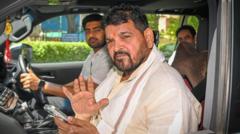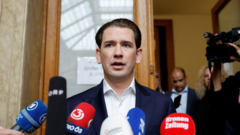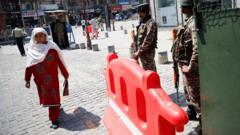As counting proceeds in Delhi, the BJP is positioned to take control of the legislative assembly, leading in 41 seats against the AAP's 28. The elections highlight a fierce contest marked by public welfare issues, despite controversies surrounding both parties.
Delhi Election Race: BJP Takes the Lead Amidst Competitive Landscape

Delhi Election Race: BJP Takes the Lead Amidst Competitive Landscape
In a closely watched election, the BJP gains momentum over the AAP in the Delhi legislative assembly contest, with over 60% of voters participating.
In a high-stakes election for the Delhi legislative assembly, Prime Minister Narendra Modi's Bharatiya Janata Party (BJP) is currently leading, securing an early lead in 41 out of the 70 seats. The incumbent Aam Aadmi Party (AAP), led by chief minister Arvind Kejriwal, trails with 28 seats as the counting of votes continues. More than 60% of the 15 million registered voters exercised their right on election day, reflecting robust public engagement.
Despite the early leads, political analysts caution that results can shift as additional votes are tallied throughout the day. A party needs at least 35 seats to establish a governing majority. Foremost in the minds of both parties is the symbolic value of Delhi, a crucial site politically and administratively, which has been under AAP's governance since 2013.
The BJP's campaign strategy has been vigorous, aiming for a comeback after being out of power in Delhi since 1998. Modi and Home Minister Amit Shah have actively participated in rallies, underscoring the party's commitment to reclaiming control over the capital. Meanwhile, the AAP has leaned heavily on its record of welfare policies, although it has faced corruption allegations that have marred its public image.
The Congress party, which historically governed Delhi from 1998 to 2013, finds itself in a challenging position, struggling to regain relevance amidst the BJP-AAP contest, with polls predicting disappointing outcomes for its candidates.
Candidates from both BJP and AAP have promised an array of welfare initiatives, notably improvements to education and healthcare, while debating over fiscal policies that favor middle-class voters in the capital. The BJP is poised to leverage recent tax cuts introduced in the federal budget, which aim to galvanize support among this crucial demographic.
A perceptible tension exists between the BJP and AAP, primarily due to allegations against Kejriwal and the AAP concerning governance and corruption. The chief minister's recent imprisonment over an alcohol policy controversy has fueled claims of political aggression against him, a notion the BJP staunchly denies.
Despite the promises of tackling welfare, both parties have largely skirted the critical issue of Delhi's notorious air pollution, which plagues the city year-round. The BJP has pledged to halve the city's Air Quality Index (AQI) by 2030 if they secure victory, although it was not a focal point in the campaign.
As the counting progresses and results begin to solidify, the impact of the election on both parties could set pathways for future governance and the political climate in India’s capital.























